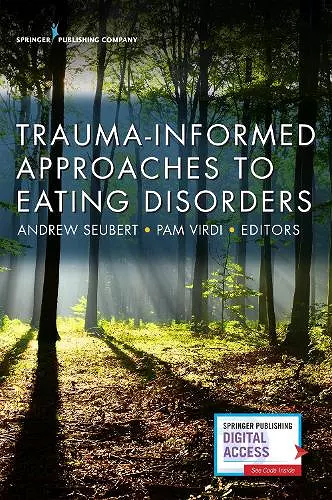Trauma-Informed Approaches to Eating Disorders
Andrew Seubert editor Pam Virdi editor
Format:Paperback
Publisher:Springer Publishing Co Inc
Published:17th Aug '18
Currently unavailable, and unfortunately no date known when it will be back

Delivers a proven treatment model for clinicians in all orientations This unique, hands-on clinical guide examines the significant relationship between trauma, dissociation, and eating disorders and delivers a trauma-informed phase model that facilitates effective treatment of individuals with all forms of eating disorders. It describes, step-by-step, a four-phase treatment model encompassing team coordination, case formulation, and a trauma-informed, dissociation- and attachment-sensitive approach to treating eating disorders. Edited by noted specialists in eating and other behavioral health disorders, Trauma-Informed Approaches to Eating Disorders examines eating disorders from neurological, medical, nutritional, and psychological perspectives. Dedicated chapters address each treatment phase from a variety of orientations, ranging from EMDR and CBT to body-centered and creative therapies. The book also reveals the effectiveness of a multifaceted, phase model approach. Recognizing the potential pitfalls and traps of treatment and recovery, it also includes abundant psychoeducational tools for the client. KEY FEATURES: Examines eating disorders from neurological, medical, nutritional, and psychological perspectives Highlights the relationship between trauma, dissociation, and eating disorders Maps out a proven, trauma-informed, four-phase model for approaching trauma treatment in general and eating disorders specifically Elucidates the approach from the perspectives of EMDR therapy, ego state therapy, somatosensory therapy, trauma-focused CBT, and many others Provides abundant psychoeducational tools for the client to deal with triggers and setbacks Offers the knowledge and expertise of over 20 international researchers, medical professionals, and clinicians
For those of us treating or experiencing eating disorders, the gap between research and practice has been a deep dark hole, into which many “cases” have fallen. When trauma - be it relational, emotional, physical, or sexual - is added to the history, this gap is deeper and more daunting than most of us are prepared for, regardless of the breadth of our clinical experience and training, our dedication, and our desire to help our patients. The fields of eating disorders and trauma have desperately needed a book like Trauma-Informed Approaches to Eating Disorders, edited by Andrew Seubert and Pam Virdi. In this volume of 26 chapters by 40 experts versed in trauma and eating disorders, they have created a treasure chest for anyone in the trenches of the combination of these disorders. After explaining the complexity of eating disorders, their intersection with trauma and attachment issues, chapters explain the neurobiology of both conditions, as well as providing information and a clinical framework for medical and nutritional personnel to guide their understanding and interventions. The ensuing chapters provide in depth descriptions of the most recent cutting-edge treatment approaches to complex eating disorders and trauma, including the most up to date research associated with these. The final section examines relapse prevention, approaches to body image, and the importance of spirituality in the ongoing recovery process. If I were in charge of the training of eating disorder and trauma professionals, this exhaustive, thought provoking volume would be mandated reading. -- Margo Maine, PhD, FAED, CEDS
By far the most comprehensive and practical text on treating Eating Disorders that I have ever seen. Covers many therapy approaches in useful detail. A "must have" book for ED therapists. -- Graham Taylor, President * EMDR Association of Australia *
Specializing in both trauma and disordered eating, I purchased Trauma-Informed Approaches to Eating Disorders as soon as it was released, and I have not stopped recommending it to other clinicians. This book offers a comprehensive, evidence-based, multi-faceted perspective to the etiology, neurobiology, cultural factors, and treatment of disordered eating. Trauma-informed clinicians who work with disordered eating at any level will want this on their shelves for years to come! -- Laura Kucharski, MA, LMFT, LPC
ISBN: 9780826172648
Dimensions: unknown
Weight: unknown
386 pages